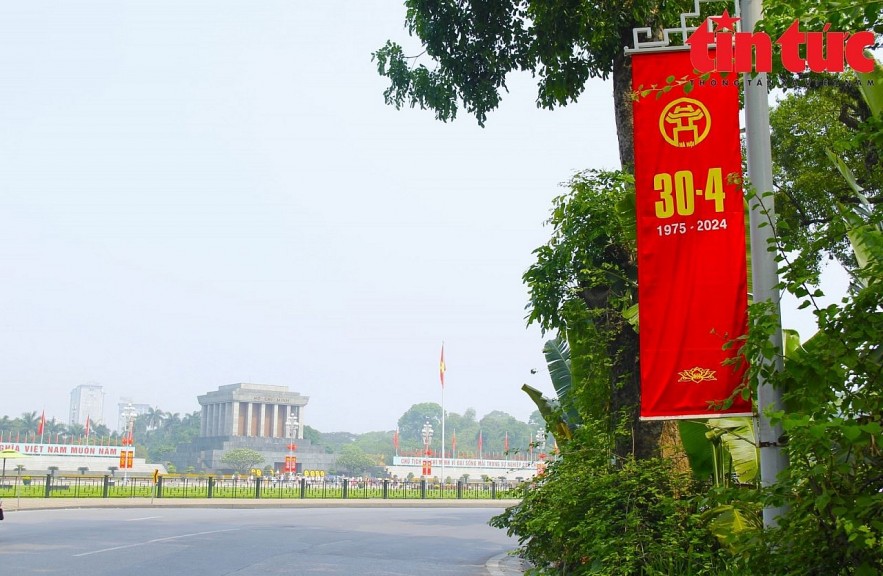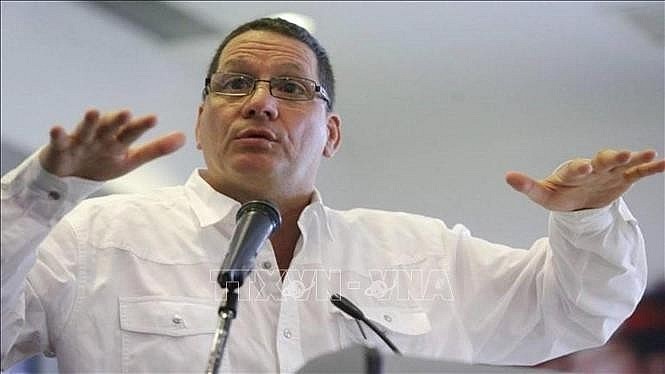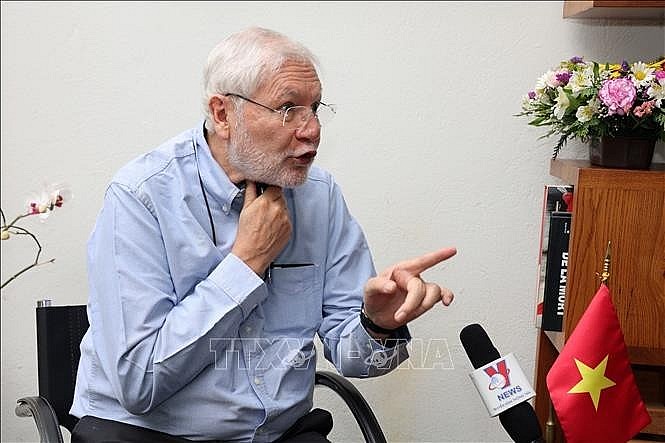Subsequently, Faría reminisced about the tales his father frequently shared about a remote, diminutive, yet intrepid nation. Tortosa emerged from hiding and witnessed his father’s radiant and elated expression as he proclaimed Vietnam’s attainment of complete independence. The young boy could sense the jubilant atmosphere that permeated the household. Tortosa’s father, Jesús Faría, who served as the Communist Party of Venezuela’s General Secretary, perpetually regarded Vietnam as a close compatriot.
 |
| Street décor emphasizes historic significance, revolutionary traditions, patriotism, and national pride. (Photo: The Doan/News Newspaper) |
In a discourse with VNA correspondents commemorating the 49th anniversary of South Vietnam’s liberation and Vietnam’s reunification on April 30, Jesús Germán Faría Tortosa, Vice Chairman of Venezuela’s United Socialist Party (PSUV), recalled that unforgettable period when Venezuelans celebrated Vietnam’s April 30 triumph as their own.
 |
| Vice President of Venezuela’s United Socialist Party (PSUV) Jesús Germán Faría Tortosa. (Photo: VNA) |
On the morning of April 30, while accompanying his father to the Communist Party of Venezuela’s Tribuna Popular newspaper office in Caracas, Tortosa encountered a bustling environment. From party leaders to journalists and editors, everyone was rushing to disseminate information about Vietnam’s triumph, which had occurred just a few hours earlier.
Nearly half a century later, the image of the Saigon government’s collapse, the final helicopter departing from the US Embassy, the liberation army entering the city, and the flag hoisted atop the Independence Palace remain etched in the mind of Venezuela’s PSUV Vice Chairman, Jesús Germán Faría Tortosa.
According to Tortosa, Vietnam’s resounding April 30 victory was a gift to progressive and peace-loving people around the world. The 1954 Dien Bien Phu victory served as a beacon of inspiration and determination for colonized nations in Asia, Africa, and Latin America, propelling them toward independence from colonial rule. The 1975 spring victory rekindled the spirit of national sovereignty, galvanizing colonized and dependent nations to fight for their freedom, he stated.
Vietnam’s April 30 triumph also served as an inspiration for the success of Venezuela’s Socialist Bolivarian Revolution 24 years later. The late Venezuelan President Hugo Chávez consistently expressed profound admiration for Vietnamese President Ho Chi Minh and the Vietnamese people’s unwavering resolve.
 |
| Former Deputy Secretariat of Interior of Mexico Jorge Alcocer Villanueva provides an interview. (Photo: Phi Hung/ VNA reporter in Mexico) |
Meanwhile, Jorge Alcocer Villanueva, Mexico’s former Deputy Secretariat of Interior, shared with the Vietnam News Agency that the harrowing images of the war, particularly the photograph of the “Napalm Girl,” compelled him and countless other students to take to the streets in protest.
During the most intense phase of the Vietnamese people’s resistance against the United States, he participated in protests against the war outside the US Embassy in Mexico City, carrying banners and chanting the slogan “Support President Ho Chi Minh, support the Vietnamese people’s just struggle.” Villanueva considers this period to be a source of pride for himself and many Mexican students of his generation. During that time, anti-war activism powerfully demonstrated the noble ideals of the intellectual youth, their love of peace, their understanding of national independence and sovereignty, and their commitment to international solidarity, he said.
In the 1960s and 1970s, despite the fact that numerous Latin American countries had achieved independence, the majority remained under the “grip” of imperialism. There was “insufficient freedom to exercise the right to national self-determination,” he stated.
The Vietnamese people’s victory served as a significant source of inspiration for Latin America, including Mexico, because it emphasized the inviolable right of each nation to self-determination, allowing them to establish their own political systems and pursue socioeconomic and cultural development in accordance with their national sovereignty.
Furthermore, Vietnam’s April 30 triumph ushered in a new era of world order, in which nations are prohibited from arbitrarily employing force to interfere in the internal affairs of other nations.



